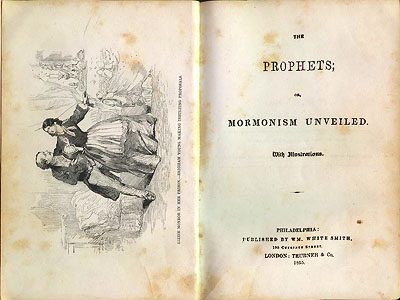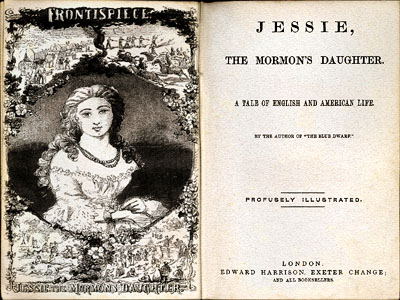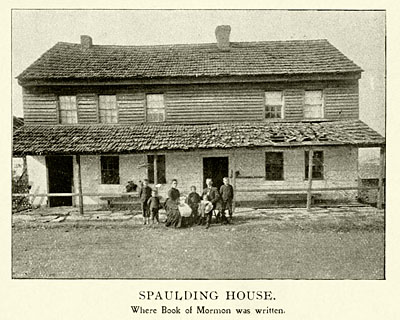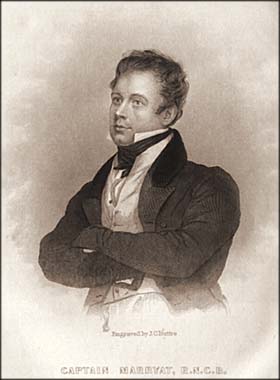
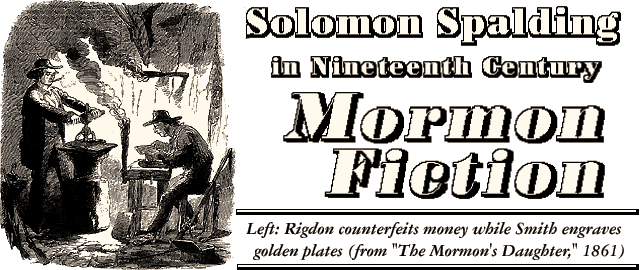
19th Century Poetical Works | Sidney Rigdon in Fictional Accounts
|
The Spalding Authorship Claims in
THE first pieces of fiction about the early Mormons were short satirical items printed
in the columns of western New York newspapers. These were followed in a few years by a more substantial piece,
purportedly relating tales told by Joseph Smith, Jr. in the court room at Chardon, Ohio at the trail of D. P.
Hurlbut. The latter story (whether truly
attributable to Smith or not) was published, along with
illustrations, as "Remarkable Events, in Eber D.
Howe's 1834 anti-Mormon book, Mormonism Unvailed. Other interesting fictional accounts involving the Mormons
appeared in various newspapers during the 1840s, including the Quincy Whig of
Sept. 18, 1841 and
Jan. 11, 1843, as well as in the Warsaw Signal of
Nov. 26, 1845 and the St. Louis
Peoples' Organ during the latter part of 1843.
Parley P. Pratt even got into the act of writing fiction with his "A Dialogue between Joseph Smith and the Devil,"
(in the NY Herald of Aug. 25, 1844),
his 1844 Angel of the Prairies, and other pieces of
imaginative prose.
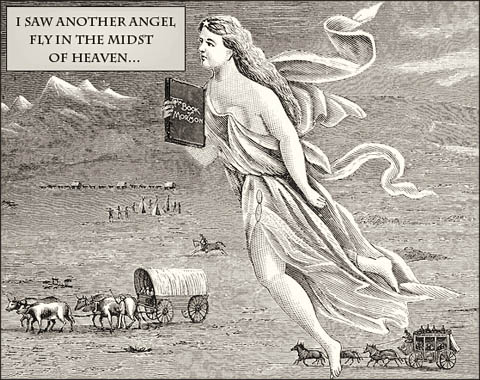
The first book containing what can truly be called "Mormon fiction" was Frederick Marryat's 1843 tale, Monsieur Violet... This is also the first known work of fiction that referred to the Solomon Spalding claims for Book of Mormon authorship. The Spalding beliefs for Book of Mormon authorship were again taken up by Orvilla S. Belisle in her 1855 book, Mormonism Unveiled, or, a History of Mormonism, printed in the USA under the title "The Prophets..." By the 1850s and 1860s fictional accounts of the Mormons were commonplace reading fare among aficionados of lurid crime and adventure tales, "penny dreadfuls," and "dime novels." One of these, written as a pot-boiler by Percy B. St. John, in 1861, was entitled: Jessie, the Mormon's Daughter. This is the only known piece of 19th century fiction in which Solomon Spalding actually makes an appearance as a character in the story.
Links to short textual excerpts from Marryat's 1843 Monsieur Violet..., as well as from the 1855 Mormonism
Unveiled... and the 1861 Mormon's Daughter are provided on this web-page for interested readers --
(click on the thumb-nail images above for graphics enlargements).
|
Further Comments on The Above Three Stories
|
THE TRAVELS AND ROMANTIC ADVENTURES OF MONSIEUR VIOLET, AMONG THE SNAKE INDIANS AND WILD TRIBES OF THE GREAT WESTERN PRAIRIES. WRITTEN BY C A P T. M A R R Y A T, C. B. IN THREE VOLUMES. VOL. I. L O N D O N: LONGMAN, BROWN, GREEN, & LONGMANS, PATERNOSTER ROW. 1843. |
Chapters I-V of vol. I of this text have not been transcribed.
Transcriber's Comments on Monsieur Violet
|
MORMONISM UNVEILED; OR, A History of Mormonism, FROM ITS RISE TO THE PRESENT TIME. LONDON: CHARLES H. CLARKE, 48, PATERNOSTER ROW. [ 1855 ] |
Note: The U. S. reprint of Orvilla Belisle's 1855 book was re-named The Prophets. It was published
in Philadelphia, the same year as the original was issued in England. Chapter II (the text with special
references to Solomon Spalding) begins on page 22 in the British edition and on page 30 in the
American reprint. A short sample of the British text is given below -- please consult
the U. S. reprint for a much longer excerpt.
|
THE |
Transcriber's Comments on Mormonism Unveiled
|
J E S S I E,
|
Chapters I-XIX of book I of this text have not been transcribed.
Chapters XXV-XL not transcribed. After stealing Emma Hale (or, "Reardon") and
the "Manuscript Found" from Solomon Spalding, Joseph Smith, Jr. and his brothers
return home -- presumably to New York -- where Smith first encounters Rigdon.
Transcriber's Comments on The Mormon's Daughter
The Spalding Authorship Claims in
19th Century Poetical Works
Frank Cowan (1878) | Wm. H. Phipps (1891) | Wm. H. Phipps (1897)
|
Frank Cowan (1844-1905) Editor: Southwestern Pennsylvania in Song and Story... (Greensburg, PA: 1878) "Book of Mormon" (excerpt): Solomon Spalding at Amity p. 17 Joseph Smith... a dreamer p. 18 |
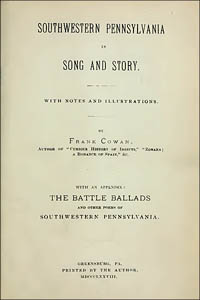
|
|
THE BOOK OF MORMON. 17 THE BOOK OF MORMON. The works of the Mound-builders in Southwestern Pennsylvania are unimportant in comparison with those in the more central portions of the valley of the Mississippi. They consist, principally, of look-out mounds commanding river views, as if to guard against surprises by a savage foe that descended the streams in fleets of canoes. However, there is a peculiar interest attached to the works of these mysterious people in the Little World, from the fact that the Reverend Solomon Spaulding, the reputed author of the Book of Mormon -- the Bible of the Mormons, -- resided here during the greater part of the time that he was engaged in its composition -- a work of fiction that grew out of his study 18 THE BOOK OF MORMON. of the mounds and other earth-works in Northeastern Ohio and Southwestern Pennsylvania. The residence of Mr. Spaulding was in the village of Amity, Washington county; and for an account of his life and labor and the falling of his MS. into the hands of Sidney Rigdon, a printer, in Pittsburgh, see Dr. Creigh's History of Washington county, pp. 89-93. It is the marvel of the age! Here lay The works of thousands long since dead and buried, The Mound-builders yclept, in glaring text Stupendous, that he that ran might read, And read aright, more readily than wrong. But -- O thou mockery of wisdom's self! This second Solomon, Jew-spectacled, From pouring over ancient Hebrew tomes, Perceived naught but with perverted vision, And saw in these same savages, presto! The long lost tribe of Israel! and wrote His chronicles accordingly in error! But what of that, compared to what hath followed -- Behold! a second Joseph * into being came, A dreamer and interpreter of dreams; And, in this fiction of the clergyman, He read the word of God proclaiming him His vicar henceforth unto all mankind. And lo! before the boy has shorn his beard, That was but mullein down when Joseph came, A nation in the wilderness has risen That, with the sight vouchsafed with zeal to sinners, Reads in this book, yclept the Book of Mormon, That which delights them most of Hell and Heaven! For, if this story teaches aught, 'tis this: Man reads not what's without, but what's within, Not what's before, but what's behind his eyeball, Writ in the red ink of his blood and being! __________ * Joseph Smith, the founder of the Mormon Church, or Church of Latter Day Saints, born at Sharon, Vermont, 23rd Dec, 1805, and killed at Carthage, Illinois, 27th June, 1844. |
|
William H. Phipps (1825-1903) Village Souvenir, and Other Poems (Pittsburgh: 1891) "Amity Annals" (excerpt): Whiskey Rebellion p. 3 Solomon Spalding p. 9 Sidney Rigdon p. 12 Joseph Miller p. 13 Old Amity Inn p. 17 |
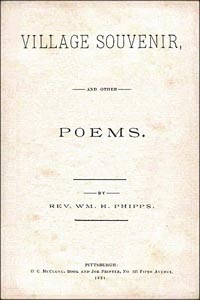
|
|
[3]
Amity, a small but ancient village, Stands on a hill surrounded by good tillage; Its scope takes in extensive hills and plains. Quite fertile with all the various grains: Pastures will meet the eye wher'er you gaze, Covered with flocks which in contentm't graze. And in the evening ev'ry sheep-cot's full. In shearing time great is the crop of wool Of finest grade. Since rebellion, in the state, for whiskey. Each money-making farmer has been frisky; Although conscience often made him squirm, He found profit in the whiskey worm. 'Twas when the preachers took a social glass The decanter round the room would pass; Saw English cannon who thought it not a sin To ask a blessing o'er a bottle of gin, That shocked us much. 4 AMITY ANNALS. The perfume was a scent for all the food; We Americans were not in pious mood; Never prayed for product of the still; Had fought it long with a determined will. 'Twas then our farmers, with their corn and rye, Brought to distillers a full supply. And when plenty crowned the harvest morn, The still obtained the Indian corn -- The bane of man. A faithful record of these hills and vales, Recalls to mind valued historic tales. Farms, the abode of comfort and of thrift. Are seen at every point their grandeur lift. 'Tis long since we coukl recount their staples Of wool, corn, and sugar from the maples. More anxious was the farmer for the fleece Than screeching wagon for the axle grease On the dry hub. The ten-mile creek, which wends its crooked way, 'Mid verdant hills, whose mighty crops of hay, From year to year, adorn their space with stacks, AMITY ANNALS. 5 For barn-room the thrifty farmer lacks. The creek quite rich in several kinds of fish, Its bass and trout oft yield a dainty dish. Socially the anglers' lips may pucker Who gets gum-drops, the other a fish-sucker, The first the best. Small animals are found upon its banks -- Rabit, squirrel and muskrat swell the ranks. Beaver, with Indian, passed away. And others in the creek no longer play. Let painter stand on bank with easel, Paint them all, sure of the weasel. The land and the amphibious tribes. Nature's work appears, from pencil, free from bribes That men may give. If parson sought fleece in by-gone days, 'Twas but the meaner ones that met his gaze. Unlike Gideon, he had no second test. With fleece wet or dry, his family were blest. Sad fact, both earth and fleece were often dry, And prayer brought no manna from the sky. Bread and water were always sure; As good soldiers, harships endure In camp or field. 6 AMITY ANNALS. Like poor laborers at hedge or ditch, Or Goldsmith's village parson, very rich; With salary of forty pounds a year. Or larger, only sixty pounds appear. Family may be four persons and a pony, Which makes the financial way look stony; As in the Saviour's day, each got his penny; It would buy much, but grumblers were many, Yet all lived well. High in rank stood the Presbyterian parsonage, New, like an infant in its early age, 'Twas then occupied by Bro. Harbison, Pleading all things by the decrees were done; Nor thought they once to change confession, Or dare speak of it in church or session. Those were days of sterling orthodoxy; Heresy was like Herod, mean and foxy, To be shunned. But on our second visit to that charge, To occupy, came invitation free and large. And moderate rent -- an offer gladly seized; Against Methodists all were then appeased. In that summer company went to war. And many a social prospect felt the jar; AMITY ANNALS. 7 A mar to all the plans of cliarch and home; For freedom's sake o'er southern roads they roam With stars and stripes. About that day arrives at parsonage One to make record in a coming age; Who now signs checks for a great, ruling firm: Greatness has fruit -- at first 'tis bud or germ; The world stands ready any to applaud Who gain position by valor, industry or fraud: Earth in loud chorus swells the great well done, And tempest wafts it high toward the sun, God may be there. The minister is not there, but labors on For God and man, that they may both be one, In hopeful view of building up the cause, Yet tempting bribes would still suggest a pause. True to history is the confession, Law tempted as lucrative profession; Yet the ministry held in its embrace. Men who for gain could not their steps retrace. Or earthly fame. 8 AMITY ANNALS. 'Tis five and thirty years since our first view Of Amity, when to a door we drew; A tall form met us, well advanced in years, And dissipated all our anxious fears. There were noble men in those early times, And none more so than brother Immes; A friend and counselor in time of need, For a young minister was apt to plead For his mistakes. Soon we saw the fun'ral of a pastor; The form was thin and looked like alabastor, A long life -- o'er ninety years -- a ripe age; His life is worthy of historic page. For seventy years had borne the shepherd's crook, Proclaiming truth from God's most sacred book. A large concourse respects the man of God -- For beloved by all was pastor Dodd For deeds of love. The annals of the Presbyterian's search, Can't find more faithful one in all the church. The warriors must all lay down their well worn shields. AMITY ANNALS. 9 And others will soon occupy the fields. At the sale of his choice, olden books, We scanned them o'er with critical looks; Obtained some from near reformation days, And they've received our study and our praise, And blessings were. In his time Spaulding chose a pastime work, 'Twas not to write up the wicked harem of the Turk, Nor little thought the mischief he would make, Shaking society with a great earthquake, By bringing back old patriarchal times, With all their ignorance and social crimes; Was lost like Cath'lics, in their breviaries -- Could not see outcome of his reveries To curse the world. No, he was innocent in the design; Ne'er thought faith and morals to undermine, How different from the truth he taught, His work of fiction on the world has wrought: In quiet cemetery he reposes, While Mormon church the wicked plan discloses, Proving to men the great calamity 10 AMITY ANNALS. From literary child of Amity, A strange novel. Historians from afar oft seek the tomb; With vigor write as for the Mormon's doom; The unfortunate grave received no care, The flat stone slab has suffered by the wear Of winter's frosts and summer's constant rains: It cannot now be read with greatest pains. When lirst we saw the name, could easily trace The inscription which time since did erase. We would restore. The aphorism that "ignorance is bliss," For Spaulding proved not itself in this, Because it gives to him a doubtful fame, But innocence defends him from all blame. At fancy's table offering votive, Can't condemn him for lack of motive. The Spaulding house -- that ancient corner frame -- Comes down to us with a romantic fame. By men of note. 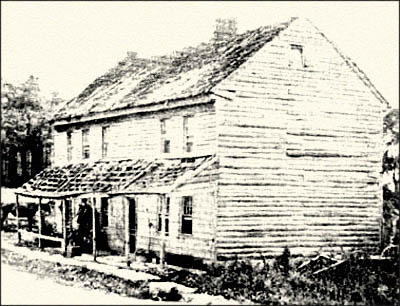 Old Amity Public House: Spaulding's home, 1814-16 (photo added to text) AMITY ANNALS. 11 There, preacher wrote many a strange vision, Theories entitled to derision, That he clothed in olden scripture phrases, Like tree, Indian or woodman grazes, To alure travelers in a wrong path, Were not inspired by their cunning wrath; They were dictates of fancy's magic spell, Hoping romance might interest and sell For his support. 'Twas when the village bore an ancient look -- Since then it has more modern aspect took; Now seems as it were new created -- Houses built and old ones renovated; Lost the appearance old and quaint -- 'Twas taken from it by repairs and paint. When we saw it back in fifty-eight. It was gloomy -- in dilapidated plight. And houses few. Nor was there yet a lower Amity. -- Monied men were fearful of calamity; Offered no loans to build the village, Lest such should end in fiscal pillage. When gold and silver came from their chests, The farmer alone in judgment notes invests; 12 AMITY ANNALS. Keener than the city barber's razor, Would take land and cattle from the grazer, To his last suit. 'Tis not the work of Michel Angelo On which our thoughts we now bestow; Travelers may not think upon the cluster; To compare them may appear but bluster. Yet there's one house of stone and one of frame -- It was from thence the book of Mormon came; The latter is entitled to some note, But Mormon confidence will not promote, Denied the plates. There Spaulding lived when he wrote the book, By Pittsburgh printer taken from the hook; Rigdon, they say, conceived the scheme. And made the book a prophet's theme, And passes it on to the famous prophet -- Better have burnt it in valley of Tophet. Romance -- reveries of Israel's tribes -- Mormons believe through ignorance or bribes. Or baser trust. 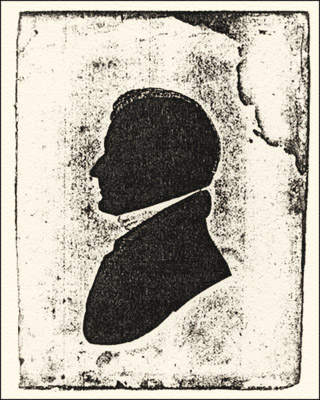 Solomon Spalding (1761-1816) -- photo added to text AMITY ANNALS. 13 In blasphemy they called it work of God, Brigham, successor in his footsteps trod, Throwing the ignorant into confusion -- Breaking domestic peace by delusion. Noted robbers in their greatest pillage Injured not like romance of this village. For it destroyed chastity and home, Teaching men in unforbidden paths to roam Away from God. They said were found by Smith on copper plates -- God's revelation of most ancient dates. Mr. Spaulding was in very feeble health; Wrote book for pleasure -- not for fame or wealth. Mr. Miller, we've seen, lived to recent date; He heard the manuscript, he would relate; Remember'd well its striking features; Told how God had dealt with erring creatures, As the lost tribes. He never claimed it was a book divine, Like Joseph Smith; a new discovered mine Of hidden plates, and treasures in the ground; How Israel's ten tribes at last were found, 14 AMITY ANNALS. Aborigines of our own continent; For a delusion he did not invent. But cunning men saw profit in the theme, And made a prophet to bear out the scheme To profit them. Sentences in book of Mormon, so old, Fresh in his memory, were often told, And we expected to enjoy the tale, But put it off, until he pass'd the vale. One lesson more upon procrastination -- Work to-day in lawful avocation; As business men seize ev'ry opening chance Their personal interests to enhance, Gaining lucre. Think how different was the early scene: Some stand, others 'gainst the old porch lean, Attentive list'ners to this book of chance, Of the wandering tribes a queer romance. Then think of crowd in temple at Salt Lake, Listening in reverence for the prophet's sake: Divinely sent they think their Joseph Smith, When only superstition's sacred myth -- Bane of the age. AMITY ANNALS. 15 What can we say of this strange combination, On land of promise and the tribe's salvation; In blasyhemy, they called it work of God; Brigham's successor in his footsteps trod, Throwing the ignorant into confusion, Breaking domestic peace by their delusion. Noted robbers, in their great pillage, Injured not like romance of this village -- A work so bad. In work, Spaulding was an innocent factor -- Made way for America's great actor; And Smith soon fell a victim to the mob, In prison, with his life, gave up the job. Soon came Young, a man of ruling power -- A Moses to them in their darkest hour, To lead them through wilderness to rest; From enemies who on their footsteps press'd, Because of sin. But let us now describe this noted house: 'Tis plain, like farmer in his jeans and blouse, For rain and sun have made it crack and warp; Winds have played it as an aeolian harp. The roof has oft received new shingles, Money supplied from where silver gingles; 16 AMITY ANNALS. Out of the farmer-broker's chests, At eight per cent, he willingly invests; Ten is better. The only question, "is he a good man?" Interrogation for many a plan, A query at the entrance to the church, Important one that bank officials search. To know his assets, their breadth and length; Pastors seek moral character -- its strength; To turn from paths of sin, so often trod, And scope for service in the church of God, All his talent. The pugilist seeks men to take the ring; Physically the very best they bring. Army, by its strong men, alone can thrive, Under eighteen nor over forty-five. Goodness may be in character or blood. All who for God, and humanity have stood? Yes, the men who in the passing ages Have blessed society -- the sages -- With precepts true. Who by their writings show a better life, Giving force to conquer in the world's strife. AMITY ANNALS. 17 We forget the house in moralizing, A fault in preacher not much surprising. This famous building is two stories high; No architectual forms to it apply. 'Tis changed in color by the faded paint, Like weary traveler, is soiled and faint. And ragged, too. On the wide front the old style weather-board. And the rear, clap-board only can afford. One room, once occupied by secret lodge, Yes, Odd or not, it's goat we now will dodge. Another by Crispian, of size and fame, In the village a well remembered name. Taking for all a kindly word of news. Drawing, like wax-end, [in his well made shoes. Upper and sole. His mental powers were almost equal To his size, as you may learn in sequel; He was not a man renowned for letters, Yet original, he knew no fetters; More free than those that occupied the stand, His flights in exhortation were so grand; The sentences came free -- he did not mutter -- There was a mighty power with Bro. Clutter, Sublime and grand.
18
AMITY ANNALS.
|
|
William H. Phipps (1825-1903) The Hamlet on the Hill and Other Poems (Pittsburgh: 1897) "Amity Annals" (excerpt): Solomon Spalding p. 17 Old Amity Inn p. 18 Mormon Blasphemy p. 24 Spalding's Grave p. 25 |
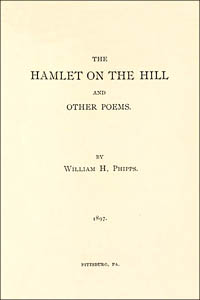
|
|
Transcriber's Comments
Monsieur Violet, (1843) According to Michael Austin, "The first work of fiction to feature Mormon characters, Monsieur Violet, was written in 1843 by Frederick Marryat..." Kenneth B. Hunsaker says much the same in his essay, Mormon Novels. Not only was Monsieur Violet the first notable work of fiction to make a place in its plot for the Mormons, the story incorporated more intriguing elements of verisimilitude than did many that later followed in its tracks. When discussing the Solomon Spalding explanation for Book of Mormon origins, for example, the writer included several believeable details from the life of Sidney Rigdon -- details which might cause the careful reader to stop and wonder whether Rigdon had actually been a "bosom friend" or Pittsburgh printer, Jonathan H. Lambdin; whether Rigdon was "a hanger-on about printing offices, where he could always pick up some little job in the way of proof correcting;" and whether Lambdin had "intrusted" to Rigdon a certain "precious manuscript" written by Solomon Spalding. Again, the reader might well wonder if there was any truth in the writer's saying that "in the beginning of 1827" Joseph Smith, Jr. had taken "a trip to Pittsburg" and there become "acquainted with Rigdon." It it, of course, possible that the writer of Monsieur Violet was acquainted some especially knowledgeable person who knew Sidney Rigdon and was able to supply such seemingly secret details from his early life. There may be another, more reasonable explanation for the appearance of these kinds of details in the book, however. "Captain" Frederick Marryat (1792 - 1848), was a popular English novelist who had once served his country as a naval captain. "Captain Marryat," in the late 1820s, took to writing adventerous tales about life at sea, beginning with a novel entitled The Naval Officer: or Scenes and Adventures in the Life of Frank Mildmay. Marryat hit upon a formula of weaving bits of biographical and historical information into his fiction which gave his books that entertaining appeal of "real life adventure." In harvesting and utilizing these genuine facts, Marryat was not above lifting entire accounts from non-fictional writers. According to Josiah Gregg, writing in 1844, Marryat's Monsieur Violet was heavily plagiarized from Gregg's own Commerce of the Prairies (portions of which had seen print earlier as newspaper reports and correspondence). Gregg says: "In Captain Marryat's recent work, entitled "Monsieur Violet," I was not a little annoyed (when I presume I ought to have been flattered) to find large portions of [my published] correspondence copied, much of it verbatim, without the slightest intimation or acknowledgment whatever, of the source from whence they were procured...." Marryat also known to have drawn heavily from G. W. Kendall's Narrative of the Texan Santa Fe Expedition in coming up with additional, authentic-sounding verbage for Monsieur Violet. Given Marryat's proclivity for surreptitiously lifting large blocks of narrative from contemporary newspapers, it is not at all unlikely that he took most of his material on the Mormons from that very source and then interwove it into his 1843 book, while comfortably settled in his London drawing room. Also, Marryat was not totally dependant upon sifting through what few news reports made it into the British papers from sources in America. He spent over two years in Canada and the United States (in 1837-39), and while there took extensive notes, incorporating much of what he experienced into his journal and publishing excerpts as A Diary in America at the end of 1839. In his 1974 "Mormonism: Views from Without and Within," Leonard J. Arrington characterized Monsieur Violetas "a rambling romance by a former British naval captain... A story of the exploits of a young Frenchman among the Indians of the Great Plains and Southwest... Although the Mormon episode comprises about fifteen percent of the total volume, it is not well integrated and appears to have been an afterthought... almost identical to sections in John C. Bennett's History of the Saints (New York, 1842)..." (BYU StudiesXIV:2, Winter 1974, p. 142). Thus, it seems likely that Marryat obtained nearly all of his information on the Mormons, Joseph Smith, and Sidney Rigdon from contemporary non-fiction, published in the popular press. If his 1843 book contains any especially trustworthy accounts from the secret life of Smith and Rigdon, such material probably come from something Marryat found published in an American newspaper, and not from a personal confidant who was "a very talented gentleman, who had every information connected with their history." Mormonism Unveiled, (1855) In 1970 Leonard Arrington and Jon Haupt published a very interesting article, entitled "The Missouri and Illinois: Mormons in Anti-Bellum Fiction" (Dialogue, a Journal of Mormon Thought V:1, Spring 1970, pp. 36-50). In that article, they say this of Orvilla Belisle's 1855 book: "The Prophets; or, Mormonism Unveiled... is thought to have been written by Orvilla S. Belisle. Miss Belisle seeks verisimilitude with six introductory chapters of "history," but, like her earlier anti-Catholic novel, her anti-Mormon novel is filled with tales of dark doings and immorality." Rebecca Bartholomew is not particularly kind to Miss Belisle, in writing of her book in Audacious Women: Early British Mormon Immigrants (Salt lake City: Signature Books, Inc., 1995). There she says: "Although her title suggested a factual treatment, neither the setting, characterization, nor plot is remotely accurate. The setting is Wales, the main character a Welsh chieftain, and the villain a Lady MacBethian chieftainess who drives the village to a Mormon doom." Indeed, Belisle's work betrays precious little evidence of the writer having any acquaintance with the Mormons and their religious lives. Like Marryat before her, the authoress no doubt depended for her information, upon less than trustworthy portrayals of the Saints in the popular literature of her day -- but, unlike Marryat, this British writer apparently never even visited the American homeland of the Mormons. In the case of her rendition of the improbable story elements tying together Solomon Spalding's writings, Sidney Rigdon, and Joseph Smith, Belisle seems to have copied much from Benjamin G. Ferris' 1854 book, Utah and the Mormons. Jessie, the Mormon's Daughter, (1861) Like Marryat and Belisle before him, Percy B. St, John was an English writer of adventure novels. According to Arrington and Haupt, "Percy Bolingbrook St. John's Jessie, the Mormon Daughter... [was published] first as a anonymous serial in the London Herald and later as a three-volume novel (1861). Jessie is an ethnocentric, hate-filled work unlike anything else that St. John wrote." If Marryat's picture of the Mormons is more or less unreliable; and Belisle's word painting is unrestrainedly fanciful; then St. John's story is downright falsehood and deception from cover to cover. The author demonstrates not even a reasonable inkling of who the Mormons are, but goes to work concocting a set of the most outrageous tales imaginable, purporting to tell who they are, where they came from, and why they are a great danger to single young English women unaware of their evil, polygamous designs. In St. John's "through the looking-glass" yarn, a seventeen year old Joseph Smith, Jr. is a hunter and "money-digger," well known by reputation to even the "Custaloga" Indians of wild and forested Ashtabula county, Ohio. Accompanied by a fictional brother named John, and two equally fictionalized representations of brothers Hyrum and William, Joseph interacts with Solomon Spalding, Emma Reardon [sic, Emma Hale], Simon Rigden [sic, Sidney Rigdon], and other extravagantly misrepresented characters drawn from a most irregular version of Mormon history. Even the most ignorant of readers must soon realize that St. John was not even attempting to create a few shreds of believability when he wrote this poor excuse for pulp fiction, suitable only for adding to the trash-pile of fish and chips scraps cluttering a third-class coach seat after an insomniac's twelve hour train ride from London to Edinburg. Given St. John's interest in frontier Ohio (as demonstrated in his 1868 Queen of the Woods, or, The Shawnee Captives and his 1869 The Silent Hunter, a novel on the Indians of the Scioto River regions), he was probably capable of producing a half-way believeable story about the real Solomon Spalding and the ancient inhabitants of Spalding's diggings in Ashtabula county. Instead, the British writer churned out a practically unreadable story to hold the dubious honor of being the only novel ever written that features Rev. Spalding among its cast of characters. Today the only known copies of The Mormon's Daughter are safely hidden away in the stacks of the British Museum and the Huntington Library. Some final remarks It is interesting -- almost amusing -- to look at how each of these three authors went about bringing Sidney Rigdon, the Spalding manuscript, and Joseph Smith all together in time and space. Marryat follows the more or less ubiquitous story told in the anti-Mormon literature of his day. That is, Rigdon obtains Spalding's manuscript through his early association with a Pittsburgh printer, and Smith meets Rigdon in some unknown encounter in Pennsylvania, long before the Book of Mormon was ever made ready for the press in Palmyra. By obscuring the details of how his Rigdon and Smith characters first met (on Smith's otherwise unknown " trip to Pittsburg"), the author is able to preserve some measure of mystery and plausibility. Belisle pulls out all the logical stops and has the "preacher" (Rigdon) stumble upon the "rifleman" (Smith) in the wilderness of Pennsylvania or New York, where Rigdon shares with the ruffian the secrets of Spalding's seductive historical romance. The two scoundrels put their heads together and quickly come up with a plan to create a new, phony religion. Although it is totally improbable and unbelievable, Belisle's tale possesses the redeming element of occasionally readable dialog and a straight forward plot-line. St. John, on the other hand, loves to weave a multitude of episodes and flashbacks into a would-be legend of confusing characters and circumstances. This writer attempts to move along his story's action by throwing in at least one cliff-hanger into every page, along with the constant titillation of amorous affairs, seductions, and impending ravishments which he never quites gets around to describing for his hopeful readers. It is likely that St. John browsed through Belisle's tale, at least once in passing, for he uses the same, unimaginative wilderness setting in which to introduce "rifleman" Smith to "preacher" Rigdon. And, as in Belisle's account, Rigdon just happens to be carrying the deceased Spalding's wonderous manuscript in his backpack. Again the two rascals join their forces and eventually work together to create a new, sham religion. To this already improbable scenario, St. John adds a second draft of Spalding's manuscript, already in Smith's possession. All of this adds up to something like improbability multiplied by itself, until the results produced are not only beyond literary belief, but beyond comprehension. To his credit, St. John attempts to give his readers something like a psychology for Joseph Smith and a rationalization for his efforts to build a new religion -- one which incorporates the sensuality of polygamy, the criminality of counterfeiting, and the spirituality of seemingly pious prayer. It is even possible that the author's shallow attempt at psycho-biography was the first ground-breaking in that fertile field, which has since produced a bountiful crop of Princes, Rileys and Brodies. It is altogether unfortunate that Percy B. St. John did not provide his shallow Spalding character with as vivid a psycho-biography as he attempted to construct for Joseph Smith. As it is, The Mormon's Daughter gives us only a shadow of a ghost -- the same insubstantial Solomon who floats through the phantasms created by dozens of unconvincing anti-Mormon historical reconstructionists. Joseph Smith would go on to make occasional cameo appearances in various obscure fictional works, most of which are no more memorable than is The Mormon's Daughter. Sidney Rigdon's family would even fill in a few pages of story-line in a twentieth century novel called Country Salt. But poor Solomon Spalding, having been summoned forth from the grave to make a single performance in but a single sorry story, almost immediately died again in its forgettable pages and drifted off to languish forever in literary limbo. |
Return to Top of Page
Spalding Studies | New Spalding Library | Old Spalding Library
Mormon Classics Cowdery Bookshelf Newspapers HistoryVault
Last Revised: Apr. 10, 2012

